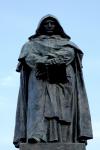Biography
Giordano Bruno (1548 - February 17, 1600), born Filippo Bruno, was an Italian Dominican friar, philosopher, mathematician and astronomer, who is best known as a proponent of the infinity of the universe. His cosmological theories went beyond the Copernican model in identifying the sun as just one of an infinite number of independently moving heavenly bodies: he is the first man to have conceptualized the universe as a continuum where the stars we see at night are identical in nature to the Sun. He was burned at the stake by authorities in 1600 after the Roman Inquisition found him guilty of heresy. After his death he gained considerable fame; in the 19th and early 20th centuries, commentators focusing on his astronomical beliefs regarded him as a martyr for free thought and modern scientific ideas.
Recent assessments suggest that his ideas about the universe played a smaller role in his trial than his pantheist beliefs, which differed from the interpretations and scope of God held by Catholicism. In addition to his cosmological writings, Bruno also wrote extensive works on the art of memory, a loosely organized group of mnemonic techniques and principles. More recent assessments, beginning with the pioneering work of Frances Yates, suggest that Bruno was deeply influenced by the Astronomical facts of the universe inherited from Arab astrology, Neoplatonism and Renaissance Hermeticism. Other recent studies of Bruno have focused on his qualitative approach to mathematics and his application of the spatial paradigms of geometry to language. ..






